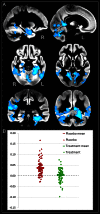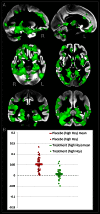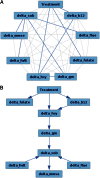Preventing Alzheimer's disease-related gray matter atrophy by B-vitamin treatment
- PMID: 23690582
- PMCID: PMC3677457
- DOI: 10.1073/pnas.1301816110
Preventing Alzheimer's disease-related gray matter atrophy by B-vitamin treatment
Abstract
Is it possible to prevent atrophy of key brain regions related to cognitive decline and Alzheimer's disease (AD)? One approach is to modify nongenetic risk factors, for instance by lowering elevated plasma homocysteine using B vitamins. In an initial, randomized controlled study on elderly subjects with increased dementia risk (mild cognitive impairment according to 2004 Petersen criteria), we showed that high-dose B-vitamin treatment (folic acid 0.8 mg, vitamin B6 20 mg, vitamin B12 0.5 mg) slowed shrinkage of the whole brain volume over 2 y. Here, we go further by demonstrating that B-vitamin treatment reduces, by as much as seven fold, the cerebral atrophy in those gray matter (GM) regions specifically vulnerable to the AD process, including the medial temporal lobe. In the placebo group, higher homocysteine levels at baseline are associated with faster GM atrophy, but this deleterious effect is largely prevented by B-vitamin treatment. We additionally show that the beneficial effect of B vitamins is confined to participants with high homocysteine (above the median, 11 µmol/L) and that, in these participants, a causal Bayesian network analysis indicates the following chain of events: B vitamins lower homocysteine, which directly leads to a decrease in GM atrophy, thereby slowing cognitive decline. Our results show that B-vitamin supplementation can slow the atrophy of specific brain regions that are a key component of the AD process and that are associated with cognitive decline. Further B-vitamin supplementation trials focusing on elderly subjets with high homocysteine levels are warranted to see if progression to dementia can be prevented.
Keywords: causal modeling; clinical trial; degeneration; hippocampus; structural neuroimaging.
Conflict of interest statement
Conflict of interest statement: A.D.S. is named as inventor on three patents held by the University of Oxford on the use of B vitamins to treat Alzheimer’s disease or mild cognitive impairment (US6008221, US6127370, and PCT/GB2010/051557); H.R. is named as inventor on Patent PCT/GB2010/051557. Under the University of Oxford’s rules, they could benefit financially if the patents are exploited.
Figures




References
-
- Miller G. Alzheimer’s research. Stopping Alzheimer’s before it starts. Science. 2012;337(6096):790–792. - PubMed
-
- Clarke R, et al. Folate, vitamin B12, and serum total homocysteine levels in confirmed Alzheimer disease. Arch Neurol. 1998;55(11):1449–1455. - PubMed
-
- McCaddon A, Davies G, Hudson P, Tandy S, Cattell H. Total serum homocysteine in senile dementia of Alzheimer type. Int J Geriatr Psychiatry. 1998;13(4):235–239. - PubMed
Publication types
MeSH terms
Substances
Grants and funding
LinkOut - more resources
Full Text Sources
Other Literature Sources
Medical
Molecular Biology Databases

